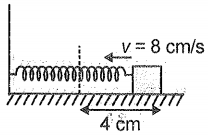A body of mass M is situated in a potential field. The potential energy of the body is given by ; where x is position, K and are constant. Period of small oscillations of the body will be:
1.
2.
3.
4.
A particle is executing SHM about origin along X-axis, between points A(, 0) and B(-, 0). Its time period of oscillation is T. The magnitude of its acceleration second after the particle reaches point A will be
1.
2.
3.
4.
A particle executes linear oscillation such that its epoch is zero. The ratio of the magnitude of its displacement in 1st second and 2nd second is (Time period = 12 seconds)
1.
2.
3.
4.
A block of mass 0.02 kg is connected with spring and is free to oscillate on a horizontal smooth surface as shown. The angular frequency of oscillation is 2 rad . The block is pulled by 4 cm (from equilibrium position) and then pushed towards the spring with a velocity of 8 cm/s. The amplitude of oscillation is (Neglect any damping)

1.
2.
3.
4. 1 cm
A particle moves on a circular path with uniform speed about the origin. The \((x-t)\) graph will be:
(\(x:\) value of \(x-\)coordinate; \(t-\)time)
| 1. |  |
2. |  |
| 3. |  |
4. |  |
A simple pendulum has time period \(T.\) The bob is given negative charge and surface below it is given a positive charge. The new time period will be:
1. less than \(T\)
2. greater than \(T\)
3. equal to \(T\)
4. infinite
A simple pendulum attached to the ceiling of a stationary lift has a time period of 1 s. The distance y covered by the lift moving downward varies with time as y = 3.75 , where y is in meters and t is in seconds. If g = 10 , then the time period of the pendulum will be:
| 1. | 4 s | 2. | 6 s |
| 3. | 2 s | 4. | 12 s |
Which of the following may represent the potential energy of a body in SHM?
(symbols have their usual meaning)
| (A) | \(m\omega^2A^2\) |
| (B) | \(\dfrac{1}{2}m\omega^2A^2\) |
| (C) | \(2A^2+\dfrac{1}{m \omega^2}\) |
Choose the correct option from the options given below:
1. (A) and (B) only
2. (B) only
3. (B) and (C) only
4. (A), (B) and (C)
A particle moves according . Average velocity of the particle in the time interval between t = 0 to t = 3 s is
1. 1 cm/s
2. 3.5 cm/s
3. 2 cm/s
4. 6 cm/s
A particle performs SHM with frequency \(f.\) The frequencies of its velocity and acceleration are, respectively:
| 1. | \(f,~f\) | 2. | \(\dfrac{f}{2},~f\) |
| 3. | \(2f,~f\) | 4. | \(f,~2f\) |






